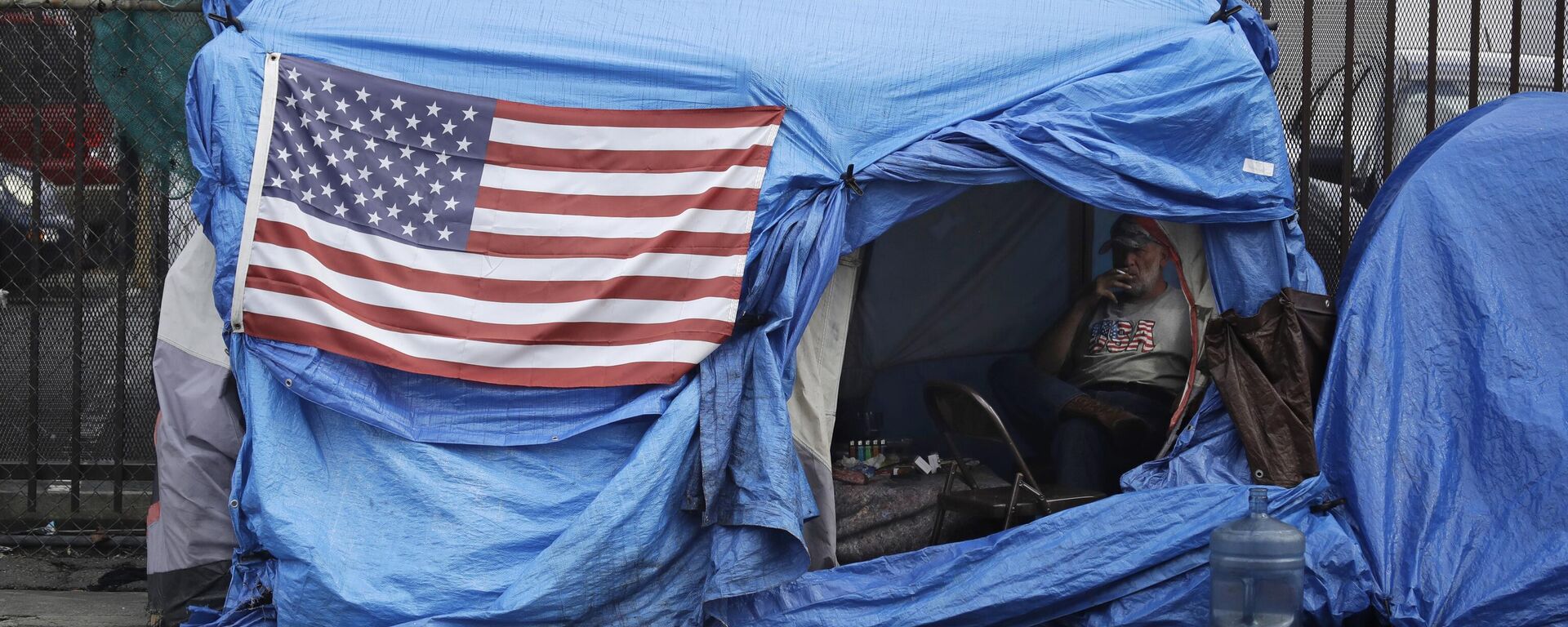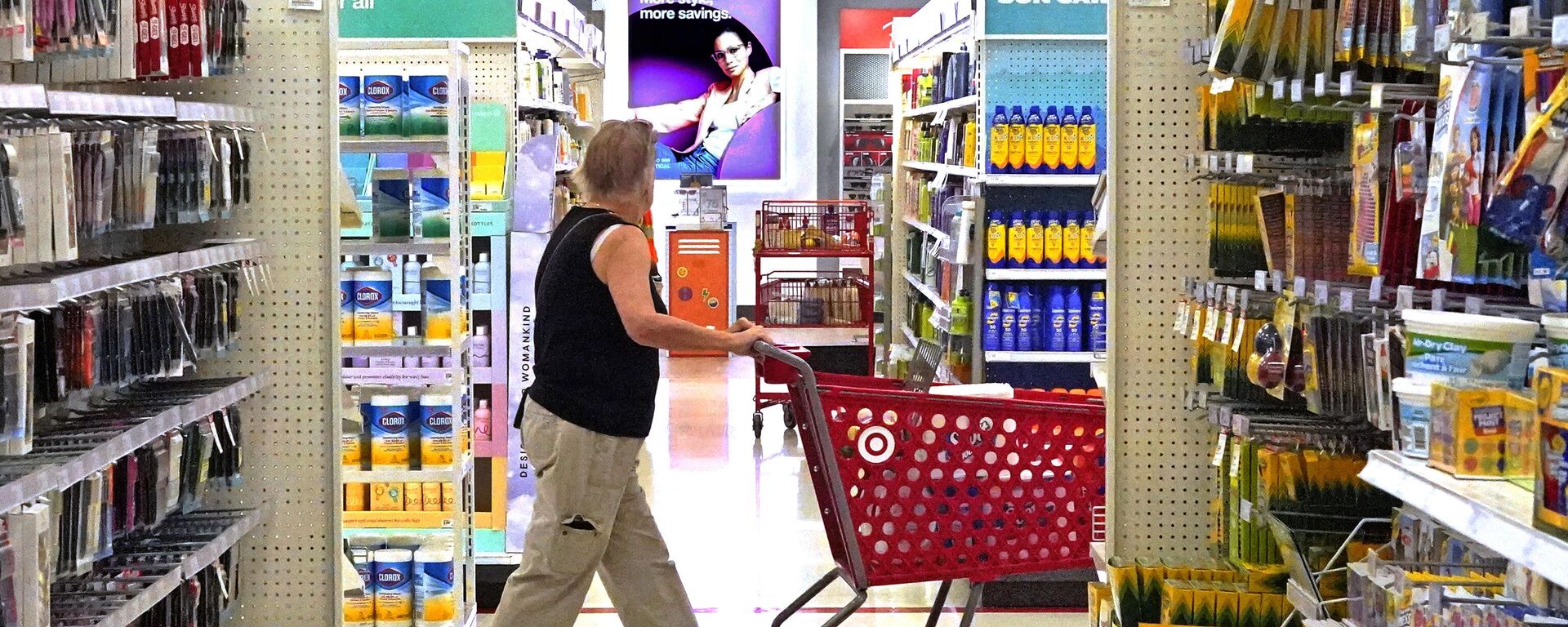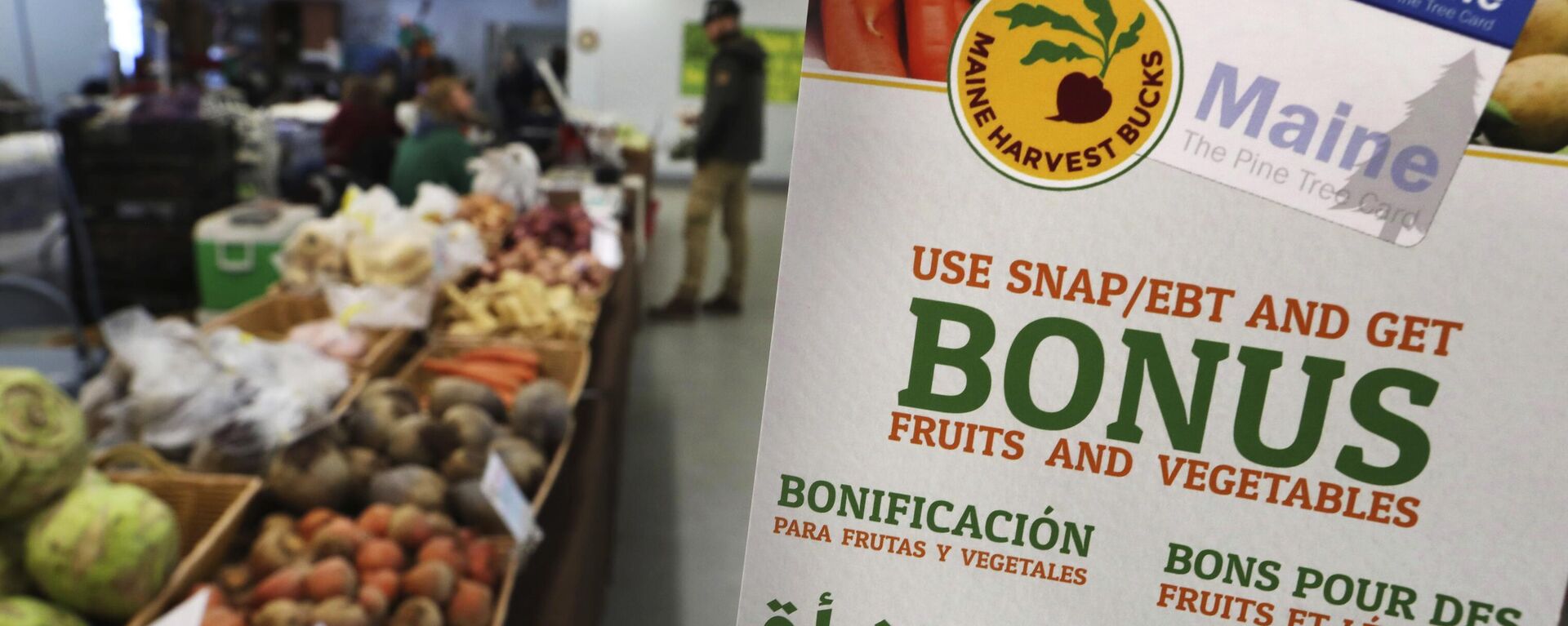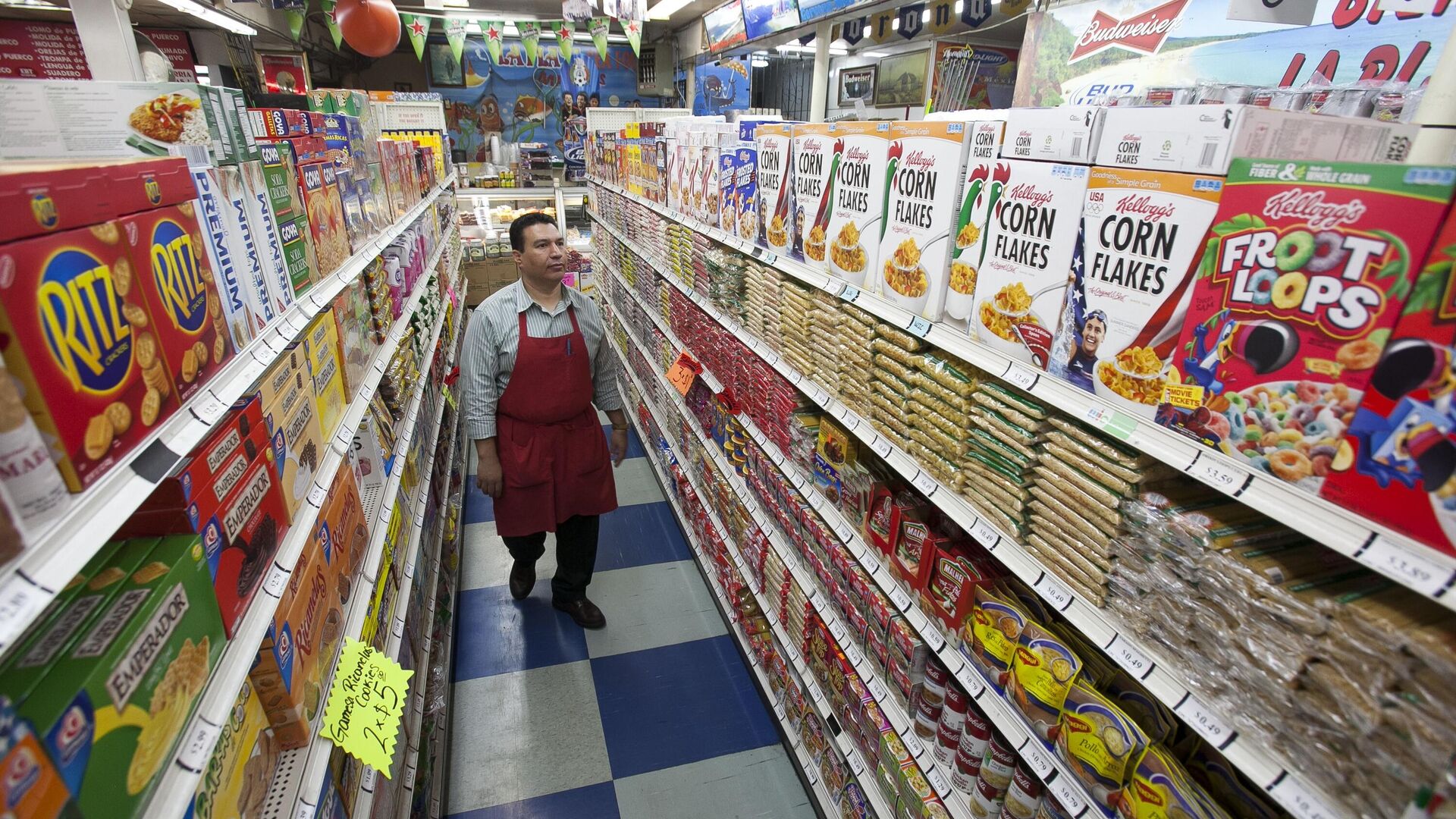https://sputnikglobe.com/20240227/consumer-spending-habits-are-helping-to-ease-inflation-in-the-us---report-1117003455.html
Consumer Spending Habits Helping to Ease Inflation in US - Report
Consumer Spending Habits Helping to Ease Inflation in US - Report
Sputnik International
In June 2022, the COVID-19 pandemic saw the 12-month US inflation rate hit a 40-year high at 9%, after averaging 2.2% between 2000 and 2020.
2024-02-27T05:03+0000
2024-02-27T05:03+0000
2024-02-27T06:48+0000
economy
joe biden
biden administration
inflation
economy
companies
bidenomics
us
hyperinflation
poverty
https://cdn1.img.sputnikglobe.com/img/07e8/02/0f/1116791586_0:0:3000:1688_1920x0_80_0_0_91316655008a58730bcf9b48dbd4add3.jpg
In June 2022, the COVID-19 pandemic saw a 12-month inflation rate hit a 40-year high at 9% in the US, after averaging 2.2% between 2000 and 2020. But consumer habits are now beating back those high inflation rates, according to a recent report, and may have helped an inflation peak of 9.1% fall to a current rate of 3.1%.The report, published on Sunday, says that consumers in the US are “fighting back” against high inflation rates in US stores. The habits that US consumers have adopted include: shifting away from name brands to store-brand items, shopping at discount stores or buying less unnecessary items like snacks and gourmet foods.More Americans are also buying used cars, as the average price of a new car reached $48,000 in March of last year, forcing some dealerships to put discounts on their new cars.JD Power data shows that average prices for vehicles fell in mid-December by 2.7% from a peak to around $46,000. But those prices are still nowhere near pre-pandemic prices due to a 26% price increase between 2020 and 2022. And some foods have fallen to below their price peaks as well, including eggs, apples and milk.This behavior contrasts that which economists saw in the 1970s and 1980s. During this time, consumers developed a paranoia that they should purchase more items in preparation for worsening inflation. This mindset itself can perpetuate inflation and lengthen the time it may take for prices to fall again.The report also noted the stark difference in pricing between popular brands and store brand items at a grocery store in Arlington, Virginia: a 12-ounce tub of Kraft’s Philadelphia cream cheese is sold for $6.69, while the store brand is just $3.19. And a 32-ounce Heinz ketchup bottle is $6.29 while the other label is just $1.69. A 24-pack of Kraft single cheese slices is $7.69, while the store label is $2.99.Together, the cost of those five brand products would equal nearly $30, while the alternatives are just $13.Quoting Samuel Rines, an investment strategist at Corbu, the report found that companies like PepsiCo, Kimberly-Clark, and Procter & Gamble have used Russia’s military operation in Ukraine as well as the rise in input costs resulting from supply-chain disruptions as an excuse to price gouge their consumers and increase their profits.But consumers who were once flush with COVID-19 pandemic stimulus checks are now exhausted by persistent inflation. They have long spent much of that money, and for some low-income consumers, have run up credit card debt and are struggling to make those payments. Now, consumers are being more cautious about their spending.The result? Companies want to please their customers, and are willing to lower their inflated prices in order to do so. The British company Unilever, which owns a number of brands known for goods ranging from ice cream to deodorant, raised their prices by 13.3% in 2022, and its sales volume fell 3.6% that same year, as a result. It then raised its prices just 2.8% last year, and saw sales rise 1.8%.The American fast food chain McDonald’s is also prepared to lower their prices in order to meet consumers with incomes below $45,000 somewhere in the middle, as they see this income bracket visiting their restaurants less and less.Inflation has been a sore spot for US President Joe Biden. As he pursues a second term in office, the primary concern that voters have is in their wallets: the economy may be improving, but inflated costs at the grocery store tend to say otherwise. The US president is reportedly weighing how hard he should hit food companies in his upcoming State of the Union Address. However, aides are advising him to focus less on the topic, as there is little that the US president can do in order to bring prices down on his own.Biden also addressed “shrinkflation”---the act of reducing the amount of product a consumer receives as opposed to the price—in his Super Bowl message in which he targeted snack food corporations. The president has also gone after “corporate greed” as the culprit for high inflation in the US. But Republicans, and even some Democrats, argue that Biden’s policies are contributing to rising inflation, and believe that the issue cannot be solely pinned on such things as “shrinkflation” or corporate greed.
https://sputnikglobe.com/20240226/whats-left-4-we-need-a-real-minimum-wage-1116985530.html
https://sputnikglobe.com/20231121/majority-of-swing-state-voters-unhappy-with-economy-under-biden-as-many-just-getting-by-1115102298.html
https://sputnikglobe.com/20231210/many-americans-are-unable-to-afford-food-even-as-unemployment-remains-low-1115515039.html
https://sputnikglobe.com/20231216/bidenomics-strikes-again-homelessness-hits-record-high-in-us-1115619187.html
Sputnik International
feedback@sputniknews.com
+74956456601
MIA „Rossiya Segodnya“
2024
News
en_EN
Sputnik International
feedback@sputniknews.com
+74956456601
MIA „Rossiya Segodnya“
Sputnik International
feedback@sputniknews.com
+74956456601
MIA „Rossiya Segodnya“
inflation, money, business, economy, biden, shopping, consumers, inflation in us, economic downturn, americans dont have money, surging inflation, debts, loans, credit cards, us economy, underlying inflation, hyperinflation, economic uncertainty, us homelessness, rent costs, housing costs, housing market, americans don't have money, housing problem, cant afford food, can't afford food, cannot afford food
inflation, money, business, economy, biden, shopping, consumers, inflation in us, economic downturn, americans dont have money, surging inflation, debts, loans, credit cards, us economy, underlying inflation, hyperinflation, economic uncertainty, us homelessness, rent costs, housing costs, housing market, americans don't have money, housing problem, cant afford food, can't afford food, cannot afford food
Consumer Spending Habits Helping to Ease Inflation in US - Report
05:03 GMT 27.02.2024 (Updated: 06:48 GMT 27.02.2024) A consumer slowdown was first predicted in May of last year, but it appears that now—after price gouging consumers—companies are prepared to listen and respond.
In June 2022, the COVID-19 pandemic saw a 12-month inflation rate hit a 40-year high at 9% in the US, after averaging 2.2% between 2000 and
2020. But consumer habits are now beating back those high inflation rates, according to a recent
report, and may have helped an inflation peak of 9.1% fall to a current rate of 3.1%.
The report, published on Sunday, says that consumers in the US are “fighting back” against high inflation rates in US stores. The habits that US consumers have adopted include: shifting away from name brands to store-brand items, shopping at discount stores or buying less unnecessary items like snacks and gourmet foods.
“Firms are telling us that price sensitivity is very much higher now,” said
Mary Daly, president of the Federal Reserve Bank of San Francisco and a member of the Fed’s interest-rate setting committee. “Consumers don’t want to purchase unless they’re seeing a 10% discount. This is a serious improvement in the role that consumers play in bridling inflation.”

26 February 2024, 05:10 GMT
More Americans are also buying used cars, as the average price of a new car reached
$48,000 in March of last year, forcing some dealerships to put discounts on their new cars.
“You see the consumer making a concerted effort to ensure that they’re getting the best price possible,” said Jonathan Chariff, CEO of South Automotive Group in Miami, Florida. “They basically feel that this is the right time to buy from a perspective of being able to get the discounts.”
JD Power data shows that average prices for vehicles fell in mid-December by 2.7% from a peak to around $46,000. But those prices are still nowhere near pre-pandemic prices due to a 26% price increase between 2020 and 2022. And some foods have fallen to below their price peaks as well, including eggs, apples and milk.
This behavior contrasts that which economists saw in the 1970s and 1980s. During this time, consumers developed a paranoia that they should purchase more items in preparation for worsening inflation. This mindset itself can perpetuate inflation and lengthen the time it may take for prices to fall again.
The report also noted the stark difference in pricing between popular brands and store brand items at a grocery store in Arlington, Virginia: a 12-ounce tub of Kraft’s Philadelphia cream cheese is sold for $6.69, while the store brand is just $3.19. And a 32-ounce Heinz ketchup bottle is $6.29 while the other label is just $1.69. A 24-pack of Kraft single cheese slices is $7.69, while the store label is $2.99.
Together, the cost of those five brand products would equal nearly $30, while the alternatives are just $13.

21 November 2023, 19:58 GMT
Quoting Samuel Rines, an investment strategist at Corbu, the report found that companies like PepsiCo, Kimberly-Clark, and Procter & Gamble have used Russia’s military operation in Ukraine as well as the rise in input costs resulting from supply-chain disruptions as an excuse to price gouge their consumers and increase their profits.
But consumers who were once flush with COVID-19 pandemic stimulus checks are now exhausted by persistent inflation. They have long spent much of that money, and for some low-income consumers, have run up credit card debt and are struggling to make those payments. Now, consumers are being more cautious about their spending.
“We’re beginning to see the consumer no longer willing to take the higher pricing,” Rines said. “So companies were beginning to get a little bit more skeptical of their ability to just have price be the driver of their revenues. They had to have those volumes come back, and the consumer wasn’t reacting in a way that they were pleased with.”

10 December 2023, 22:55 GMT
The result? Companies want to please their customers, and are willing to lower their inflated prices in order to do so. The British company Unilever, which owns a number of brands known for goods ranging from ice cream to deodorant, raised their prices by 13.3% in 2022, and its sales volume fell 3.6% that same year, as a result. It then raised its prices just 2.8% last year, and saw sales rise 1.8%.
The American fast food chain McDonald’s is also prepared to lower their prices in order to meet consumers with incomes below $45,000 somewhere in the middle, as they see this income bracket visiting their restaurants less and less.
“Consumers are more wary — and weary — of pricing, and we’re going to continue to be consumer-led in our pricing decisions,” Ian Borden, the chief financial officer of McDonald’s, told investors.
Inflation has been a sore spot for
US President Joe Biden. As he pursues a second term in office, the primary concern that voters have is in their wallets: the economy may be improving, but inflated costs at the grocery store tend to say otherwise.
The US president is
reportedly weighing how hard he should hit food companies in his upcoming State of the Union Address. However, aides are advising him to focus less on the topic, as there is little that the US president can do in order to bring prices down on his own.
Biden also addressed “shrinkflation”---the act of reducing the amount of product a consumer receives as opposed to the price—in his Super Bowl message in which he targeted snack food corporations. The president has also gone after “corporate greed” as the culprit for high inflation in the US. But Republicans, and even some Democrats, argue that Biden’s policies are contributing to rising inflation, and believe that the issue cannot be solely pinned on such things as “shrinkflation” or corporate greed. 
16 December 2023, 10:45 GMT






